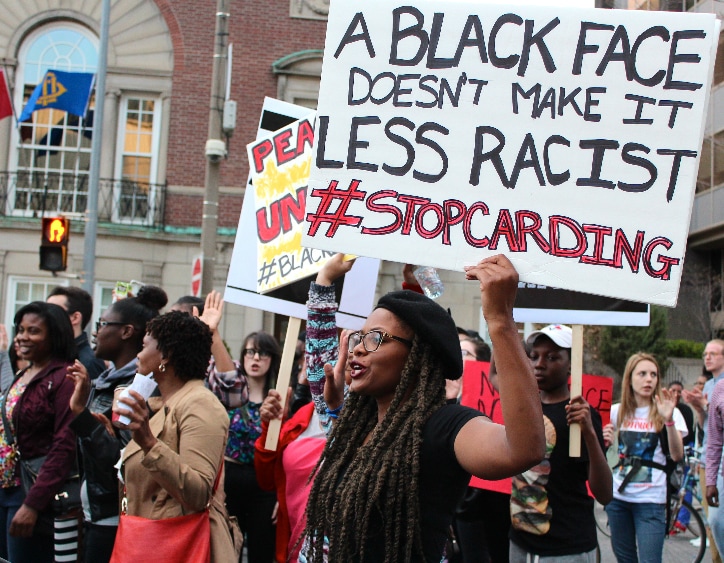KJIPUKTUK (Halifax) – There’s something terribly disingenuous about the way Halifax is dealing with carding and the racial profiling that is part and parcel of that practice. Carding is a political issue that requires political solutions hammered out in public. What we get instead is a lengthy and secretive analysis of “what the data really tells us.”

Just a reminder of how we got here. Early in 2017 a freedom of information response to the CBC revealed that Black people in Halifax are 3.1 times more likely to be subjected to a police street check than white people. 4,100 people who were carded in the last 11 years, sometimes more than once, were identified as Black. That’s the equivalent of nearly one-third of Halifax’s entire black population.
In March Black many community members attending a meeting at the North End public library left no doubt that in their lived experience police racism is very much the reason for these statistics. Nobody at that meeting asked for an analysis of what these numbers really mean. Black people in Halifax know all too well how racism manifests, and they are tired of being stopped and entered in police computers for no valid reason.
After the CBC story broke Black community members were quick to ask the Nova Scotia Human Rights Commission (NSHRC) to investigate the practice and demanded an immediately halt to street checks, which they argued violates citizens’ individual rights under the Constitution.
Somehow we ended up with something entirely different. Rather than an immediate stop, rather than at least talking about rigorous checks and balances, we are now, with the help of the Human Rights Commission, going to hire an expert to ponder whether the statistics really prove that we are dealing with racial profiling.
This exercise hasn’t even started yet, and already it is behind schedule because there is no consensus on who to hire. Not that the Human Rights Commission believes any of this is our business, witness the many emails I had to write to establish whether there even was a delay.
This new approach is very much a victory for the Halifax Regional Police. From the time the CBC first broke the story it has argued that more analysis is required. This from the same police department that earlier was ordered by the NSHRC to keep race statistics after it was found to have engaged in racial profiling in the Kirk Johnson case, and for eleven years did not bother to examine these very same stats.
It’s also a victory for all the politicians who know a hot potato when they see one, and beat a hasty retreat. Racism within the Halifax police department is not something anybody in power wants to talk about it. Can’t have politicians telling the police what to do, said Stephen McNeil, as if there isn’t provincial legislation that aims to do exactly that. “Fix the tool, don’t throw out the toolbox,” said mayor Savage.
Fundamental to the argument in favour of further analysis of the kind that is now scheduled is the Halifax police contention that somehow carding in Halifax is different from what transpires in Ontario and elsewhere in North America.
“A lot of those fields are populated through prior contact with the criminal justice system,” HRP research coordinator Chris Giacomantonio told the Coast’s Kaila Jefferd-Moore yesterday. “By and large, the street checks that Halifax Regional Police conduct are involving people who have past criminal history or past involvement with the justice system in some other way.”
That’s somehow supposed to make it alright. Unlike Ontario, where there was a clear anti-Black bias, folks subjected to street checks in Halifax are bad people, who just happen to be disproportionately Black. Or so goes the argument. Couple of things that strike me as pretty elementary.
Past criminal history or past involvement with the justice system does not mean you’re a bad person now, if ever.
As well, note the “by and large,” as in “by and large street checks are involving people who have past criminal history.” Others who end up being street checked in Halifax do not have a criminal past at all, but are carded only because they associate with these supposedly bad people. Like somebody’s little brother, or even somebody’s lawyer.
It doesn’t matter how many people are affected, wrong is wrong, and arguing that they’re mostly bad people doesn’t hold water.
Meanwhile the discussion we should be having is not happening at all.
Should we even allow street checks? Is it worth it, considering the damage the practice does to relations between communities and police? And is it even useful? If so, what can we do to establish controls, along the lines of what Ontario put in place? How can we make it easier for people who feel harassed by police to file a complaint?
Another good one, why did we have to wait for a CBC story for Halifax police to even pay attention to these stats?
None of this discussion is about to happen, and for a city with police department that many in the Black community perceive as racist, that is a terrible thing.
If you can, please support the Nova Scotia Advocate so that it can continue to cover issues such as poverty, racism, exclusion, workers’ rights and the environment in Nova Scotia. A pay wall is not an option since it would exclude many readers who don’t have any disposable income at all. We rely entirely on one-time donations and a tiny but mighty group of kindhearted monthly sustainers.




good work robert.
Articles like these are why I support the Advocate and why I tell everyone else to, as well. Cheers, Mr. Devet!